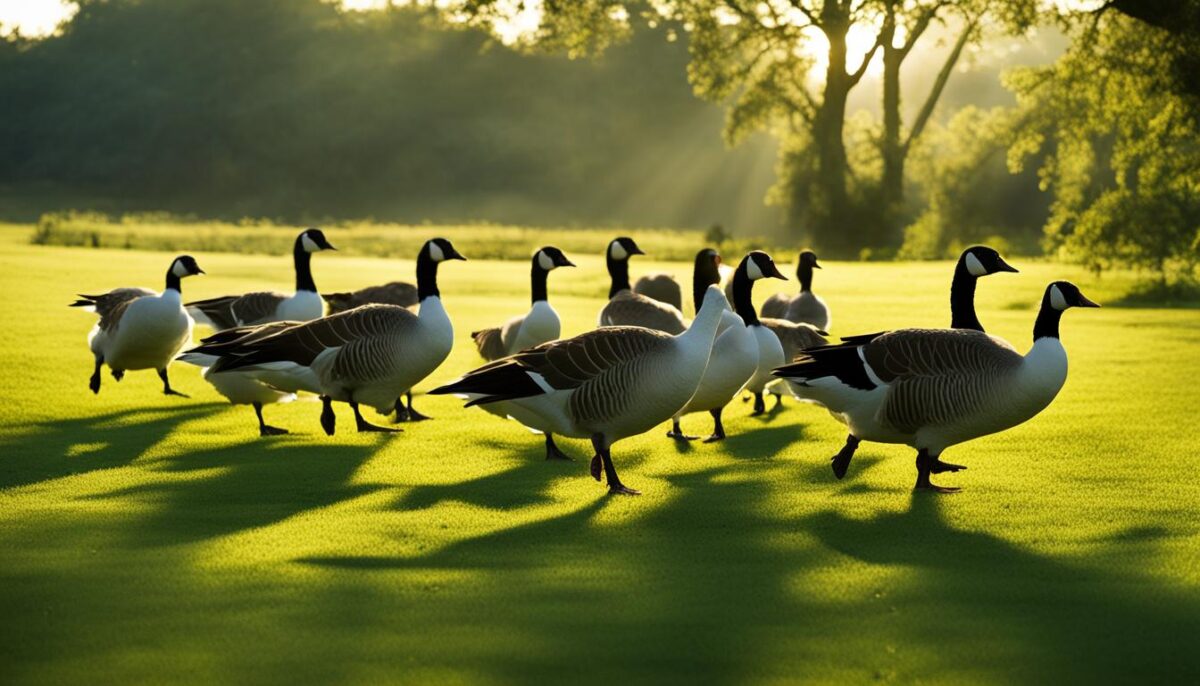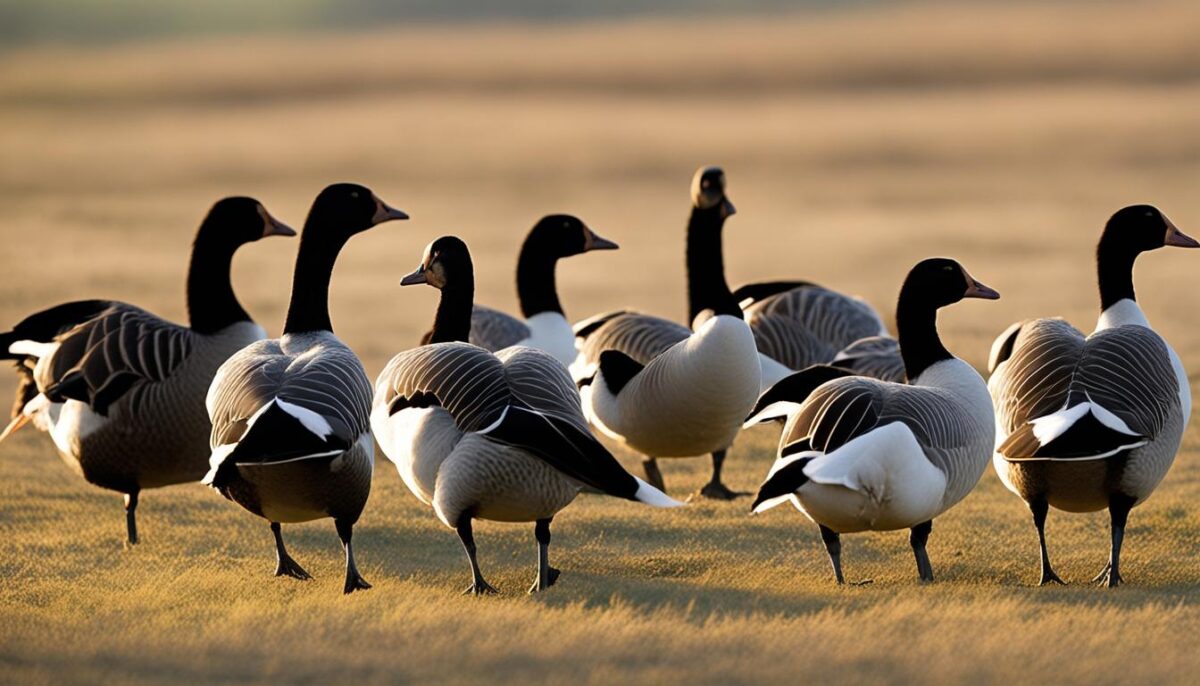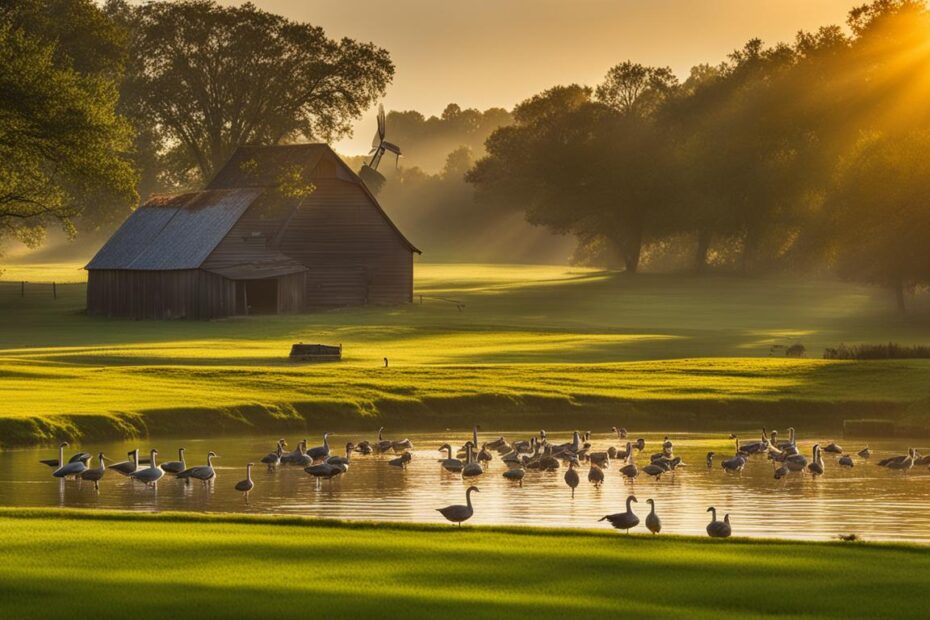Raising free range geese on your homestead or farm can provide numerous benefits. From serving as guard animals to producing delicious eggs and meat, geese offer a sustainable and natural approach to poultry farming. In this article, we will explore the advantages of raising free range geese, including their low-maintenance nature, their ability to forage and weed, their suitability as guard animals, and the quality of their eggs and meat.
Key Takeaways:
- Free range geese offer a sustainable and natural approach to poultry farming.
- Geese can serve as guard animals, deterring potential intruders.
- They have low-maintenance requirements and can forage for their food.
- Geese lay delicious eggs that are highly valued by chefs and crafters.
- Raising geese can provide an additional source of income for your farm.
Small Flocks of Geese Make Great Guard Animals
Geese are highly regarded as effective guard animals due to their unique behavior and protective nature. Their presence alone can deter potential intruders and provide an extra layer of security for your property.
One of the key reasons why geese make excellent guard animals is their size and volume. They are large birds that honk loudly, creating a loud and intimidating sound that can alert you to any unusual activity. Their hissing and aggressive behavior can further discourage intruders from approaching. Geese are territorial by nature, and they will defend their territory and flock vehemently.
Geese also have a keen sense of observation and can detect even the slightest disturbances. Their keen eyesight and acute hearing allow them to detect predators or strangers from a distance, providing an early warning system for your property. They are known to be highly protective of other animals like chickens and ducks, keeping them safe from potential threats.
“Geese are large, loud, and territorial, making them an excellent deterrent. Their honking and hissing can alert you to any unusual activity, making them a valuable addition to your homestead security system.”
Table: Comparison of Geese Behavior as Guard Animals
| Behavior | Advantages | Limitations |
|---|---|---|
| Territorial Nature | Provides a strong deterrent to intruders | May become aggressive towards unfamiliar visitors |
| Alertness | Keen senses detect potential threats from a distance | Can be overly sensitive to harmless stimuli |
| Protective Instinct | Defends other animals in the flock | Can be aggressive towards other animals or people |
It’s important to note that while geese can be effective guard animals, they require appropriate training and socialization to ensure their behavior is manageable. They should be raised from a young age and exposed to different people and environments to prevent aggression towards harmless individuals. Regular interaction and handling can help establish a bond of trust between the geese and their caregivers.
Having geese as guard animals not only adds an additional layer of security to your property but also provides a natural and sustainable approach to protecting your farm or homestead.
Geese Don’t Need Much for Shelter
When it comes to providing shelter for your free range geese, simplicity is key. These hardy birds are well-suited to living outdoors and only require minimal protection from extreme weather conditions. A basic three-sided shelter with a roof is sufficient to meet their needs. Alternatively, geese can seek shelter in natural surroundings such as trees or bushes. Their resilient nature allows them to withstand cold temperatures, but they may seek shelter during severe weather conditions.
Unlike some other poultry species, geese do not require elaborate housing structures or extensive maintenance. Their ability to thrive in a variety of environments makes them a suitable choice for both small-scale and larger farms. By providing them with a simple shelter, you can ensure their well-being while also promoting their natural behavior of living and foraging outdoors.
| Type of Shelter | Advantages |
|---|---|
| Three-sided shelter with a roof | Provides adequate protection from extreme weather |
| Natural surroundings (trees, bushes) | Allows geese to seek shelter in their preferred environment |
It is important to note that geese are adaptable creatures, and their shelter requirements may vary depending on your specific climate and geography. If you live in an area with particularly harsh winters or frequent inclement weather, you may need to provide additional protection or consider alternative housing options for your geese.
Overall, the minimal shelter requirements of free range geese make them an attractive choice for those seeking low-maintenance and sustainable poultry farming. By prioritizing their well-being while keeping their natural behavior in mind, you can ensure that your geese thrive in their outdoor environment.
Raising Geese Can Mean Extra Income
Raising free-range geese provides a unique opportunity to generate additional income for your farm or homestead. By offering both geese eggs and meat, you can tap into a niche market and attract customers who value high-quality, organic poultry products. Here’s how you can turn your free-range geese into a profitable venture.
Geese Eggs: A Gourmet Delicacy
Geese eggs are larger than chicken eggs and have a rich, creamy flavor that is highly prized by gourmet chefs and food enthusiasts. Their unique taste and texture make them a sought-after ingredient for delicious recipes and gourmet dishes. By selling geese eggs, you can command a premium price, especially during the winter months when egg production from other poultry breeds is limited. Take advantage of this demand by marketing your geese eggs as a gourmet delicacy.
To maximize the profitability of your geese egg sales, consider packaging them in beautiful cartons or baskets and emphasizing their organic, free-range qualities. Highlight the nutritional benefits and unique taste of geese eggs in your product descriptions. Additionally, reach out to local restaurants, bakeries, and specialty food stores to establish partnerships and secure regular orders.
Delicious and Distinctive Geese Meat
Geese meat is known for its distinct flavor and succulent texture. It offers a delicious alternative to traditional poultry meats, making it attractive to consumers seeking unique culinary experiences. By raising geese for meat, you can tap into the growing demand for ethically raised, pasture-fed poultry.
To market your geese meat effectively, emphasize its superior taste and the ethical benefits of raising geese on your farm. Highlight the free-range lifestyle of your geese, their natural diet of grass and foraged greens, and the absence of antibiotics or hormones in their meat. Consider promoting your geese meat through farmers markets, online platforms, and local gourmet food retailers to reach a wider customer base.
| Product | Price | Market Potential |
|---|---|---|
| Geese Eggs | $4.99 per egg | Increase during winter months |
| Geese Meat | $12.99 per pound | Growing demand for organic, ethically raised poultry |
With careful planning, marketing, and a focus on quality, raising free-range geese can become a profitable income stream for your farm or homestead. By capitalizing on the unique characteristics of geese eggs and meat, you can attract customers who appreciate the natural, sustainable farming practices associated with free-range geese.

Geese are Good Foragers/Vegetarians
Geese are excellent foragers and thrive on a vegetarian diet. They have a natural inclination to graze on grass, weeds, hay, and herbs, making them well-suited for free range farming. Their ability to find most of their food through foraging not only reduces feed costs but also promotes a more sustainable and natural approach to poultry farming.
By allowing geese to roam and graze on pastures, you provide them with a diverse range of fresh greens and plant material, which contributes to the flavor and quality of their eggs and meat. Their diet of nutrient-rich forage results in eggs with richer yolks and meat with distinct flavors that are highly valued by consumers.
Foraging is not only beneficial for the geese themselves but also has positive environmental impacts. Geese play a role in controlling weed growth as they naturally consume and control weed populations on pastures. This reduces the need for chemical weed control methods, making geese a natural and environmentally friendly alternative.
Foraging Behavior Table
| Food | Benefits |
|---|---|
| Grass | Provides essential nutrients and fiber |
| Weeds | Controls weed population naturally |
| Hay | Source of additional fiber and roughage |
| Herbs | Enhances flavor profiles of eggs and meat |
“Geese are natural foragers and thrive when allowed to graze on grass and other plant material. Their diet of fresh greens not only contributes to the quality and flavor of their products but also reduces the need for additional feed and promotes sustainable farming practices.”
Interesting Goose Facts
Geese are fascinating birds with unique behaviors and characteristics. Understanding these interesting facts about geese can help you appreciate their natural behaviors and better care for them on your homestead or farm.
Monogamous Mating
Geese are known for their monogamous mating behavior. Once they find a mate, they form strong pair bonds and remain together for life. This loyalty to their partners is remarkable and can provide a sense of stability and companionship in their flock.
Goose Poop as Fertilizer
While goose poop may not be the most appealing aspect of raising geese, it can actually be beneficial for your farm or garden. Goose droppings are rich in nutrients and can serve as a natural fertilizer. When properly managed, goose poop can enhance soil quality and contribute to healthy plant growth.
Common Goose Behaviors
Geese have a variety of interesting behaviors that make them captivating to observe. From their graceful flight formations to their honking and hissing sounds, geese have unique ways of communicating with each other. They are also highly social animals, often seen gathering in large flocks and working together to protect their territory.
Overall, geese are remarkable creatures with intriguing behaviors and traits. By understanding these interesting goose facts, you can develop a deeper appreciation for these birds and their role in sustainable farming.
Different Breeds of Geese
When it comes to raising free range geese, there are several different breeds to choose from. Each breed has its own unique characteristics, making it important to consider your specific needs and preferences. Let’s take a closer look at some popular geese breeds:
Toulouse Geese
The Toulouse geese are one of the most well-known and commonly raised breeds. They are large birds with a calm and gentle temperament. Toulouse geese are primarily raised for meat production and are known for their flavorful and succulent meat.
African Geese
African geese are easily recognizable by their large size and striking appearance. They have a distinctive knob on their forehead and make excellent guardians with their alert and vocal nature. African geese are primarily kept for ornamental purposes but can also be raised for meat and eggs.
Chinese Geese
Chinese geese are smaller in size compared to other breeds but are highly regarded for their egg-laying abilities. They are known to be prolific layers, producing a good number of large eggs. Chinese geese are also valued for their ornamental qualities and make lovely additions to any farm or homestead.
Sebastopol Geese
Sebastopol geese are famous for their unique feathering, which resembles soft curls or spirals. They are considered one of the most visually stunning geese breeds. Sebastopol geese are primarily kept for ornamental purposes, rather than for meat or eggs.
In addition to these popular breeds, there are also heritage geese, which are native to North America and often raised for conservation purposes. These geese represent the historical breeds of the continent and play an important role in preserving genetic diversity.
Now that you are familiar with some of the different breeds of geese, you can choose the one that best suits your needs and embark on your free range geese farming journey.

Commonly Asked Questions about Geese
When it comes to raising free range geese, there are several common questions that often arise. Let’s dive into some of these frequently asked questions and provide helpful answers:
1. Do geese need a pond?
While geese are naturally drawn to water, they do not necessarily need a pond to thrive. While having access to a pond or a body of water can provide additional enrichment for geese, they can also be raised successfully without one. Geese can be kept in open pasture or fenced areas with access to clean drinking water. As long as they have enough space to roam and forage, they can lead healthy lives without a pond.
2. Can goslings be raised with chickens?
Yes, goslings can be raised alongside chickens. It’s important to introduce them gradually and ensure they have a separate area for the first few weeks until they grow larger and stronger. Goslings have different nutritional needs compared to chicks, so providing a balanced diet is crucial. As they mature, they can integrate and coexist with chickens, benefiting from each other’s company and creating a diverse poultry community.
3. How can I make geese friendly?
Building trust with geese requires patience and consistency. Spend time with your geese, hand-feed them treats, and talk to them in a calm and gentle manner. Avoid sudden movements or loud noises that could startle them. Over time, they will become more comfortable with you and may even approach you willingly. Remember, each goose has its own personality, so building a bond may take longer with some individuals.
4. How can I sex geese?
Determining the gender of geese can be challenging, especially in younger birds. However, there are a few visual cues that can help. Male geese, known as ganders, are generally larger in size, have longer necks, and exhibit more aggressive behavior during mating season. Females, known as geese, are typically smaller with shorter necks. Additionally, geese tend to lay eggs, while ganders do not. If unsure, it may be helpful to consult an experienced goose breeder or veterinarian for assistance.
By addressing these frequently asked questions, we hope to provide you with valuable insights and guidance as you embark on your journey of raising free range geese.
Conclusion
By raising free range geese, you can experience a multitude of benefits. These beautiful birds not only serve as excellent guard animals, but they also require minimal maintenance and provide high-quality eggs and meat. Furthermore, their natural foraging habits contribute to sustainable farming practices.
When it comes to protecting your homestead or farm, geese are a valuable asset. Their large size, loud honking, and territorial nature make them highly effective guard animals. With geese on your property, you can have peace of mind knowing that potential intruders will be deterred and your other animals will be kept safe.
In addition to their protective qualities, geese are low-maintenance birds. They do not require elaborate shelters and can withstand cold temperatures. Their ability to find shelter in natural surroundings, such as trees and bushes, makes them adaptable to various weather conditions. This makes raising geese a convenient and hassle-free endeavor.
Lastly, the eggs and meat produced by free range geese are of exceptional quality. Gourmet chefs and crafters highly value the large and beautiful eggs laid by geese. These eggs can be sold at a premium price, especially during the winter months when egg production is limited. Geese meat is also known for its distinct flavor and texture, making it a sought-after product in the market.
Embrace the benefits of free range geese and embark on a journey of sustainable farming. With their guard animal abilities, low-maintenance nature, and high-quality products, raising geese is a rewarding and environmentally friendly choice for any homestead or farm.
FAQ
Do geese need a pond?
While geese enjoy having access to water, a pond is not a necessity. Geese can thrive without a pond as long as they have access to clean drinking water and a suitable environment to forage and roam.
Can goslings be raised with chickens?
Yes, goslings can be successfully raised with chickens. However, it’s important to provide them with appropriate housing and ensure that their nutritional needs are met. Additionally, keep in mind that geese and chickens have different growth rates, so it’s important to monitor their feeding and make adjustments as necessary.
How can I make geese friendly?
Building trust with geese takes time and patience. Regular interaction, offering treats, and creating a calm environment can help in making geese more friendly. It’s important to approach geese slowly, avoiding sudden movements or loud noises.
How can I determine the gender of geese?
Determining the gender of geese can be challenging, especially when they are young. As geese mature, males tend to develop larger bodies and more prominent necks. Additionally, males often have a louder and more honking call compared to females. However, for a more accurate determination, consulting an experienced poultry expert or veterinarian is recommended.


